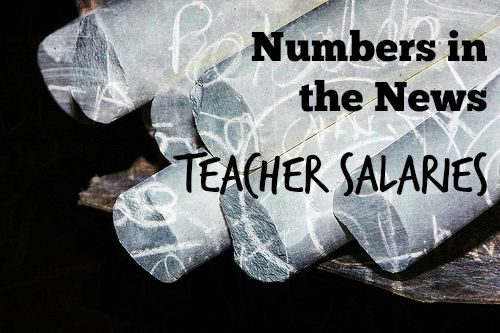The series, Numbers in the News, looks at the numbers underlying hot topics in the U.S. The goal of these posts is not to take a political or moral stand but to simply outline reliable data about these issues. Look for these posts to appear monthly.
Big thank you this week to Annie Logue, a fellow freelance writer and one of my go-to folks for economic data. Check out her books and other writing.
Teacher salaries: what a big debate. Are teachers paid too little? Too much? Haven’t teachers’ unions bumped up teacher pay and benefits so that teachers are given a far greater piece of the pie than similar jobs in the private sector? Are teachers whining too much?
Like many numbers in the news, there are myths surrounding teacher pay. Talk to a weary teacher in an inner city school, and you might hear about working far more than 40 hours per week. Another teacher might tell you that he’s got a second job just to help make ends meet.
But many parents and politicians have a very different view. They say that teachers are well compensated, especially given their generous benefits packages and summers off.
There are a lot of caveats about this particular issue, so bear with me. It is challenging to generalize about teachers’ salaries, because like with many other professions they depend on a variety of factors: time on the job, geographic area, and perhaps most important here, the effectiveness (or even presence) of a teachers’ union. But the biggest caveat is this: comparing public sector and private sector jobs is generally not fair. It makes sense to compare teachers’ salaries from state to state or region to region. But what does it mean to compare teachers’ compensation with those of managers? What does it mean to be a manager? How are these categories developed?
And then there is the whole issue of teachers’ time “on the clock.” I’ll address that concern at the end of this post.
Still, I’m taking the risk to make these comparisons, even knowing that they’re not entirely fair–because they’re the only options we have. I’m going to assume (based on the salary ranges and the descriptions in the tables) that managers are college educated (or the equivalent) and have similar responsibilities as teachers. Teachers manage classrooms, budgets and schedules in similar ways that marketing managers manage staffs, budgets and schedules.
And yes, this is a compromise that is not fair. If you have a better idea, I would love to hear it. Honestly.
To help draw some clumsy conclusions, I’ve turned to the Bureau of Labor Statistics, a federal agency that keeps track of things like salaries and benefits packages. You can find all of my numbers here. Please do check them.
First off, how much do primary, secondary and special education teachers earn?
Total teacher compensation is $56.89 per hour worked. About 69% of that ($39.20) is wages and salaries, while 31% ($17.69) is total benefits.
So close to a third of a teacher’s compensation package is devoted to benefits. This is an important point, because the public teacher is one of the few workers in the country who still earns retirement and savings. Most pensions and retirement plans went away years ago. But let’s break down the teachers’ benefit package a little more.
Of the teacher’s benefit package, an average of $2.49 is spent on paid leave, $0.17 is spent on supplemental pay, $6.34 is spent on insurance, $5.85 is spent on retirement and savings and $2.84 is spent on legally required benefits.
All of those amounts are per hour, remember. So for every hour worked, a teacher earns, on average, $5.85 in retirement benefits.
What about managers in the private sector? Turns out that the differences are not all that stark.
Total management compensation is $58.28 per hour worked (full-time). About 68% of that ($39.59) is wages and salaries, while 32% ($18.70) is total benefits.
So again, the benefits packages for managers in the private sector are about a third of the total compensation packages. The per-hour compensation for private-sector managers and public school teachers are pretty darned close. Now we can dig into the compensation packages.
Of the private-sector manager’s benefit package, an average of $5.11 is spent on paid leave, $2.73 is spent on supplemental pay, $4.32 is spent on insurance, $2.78 is spent on retirement and savings and $3.75 is spent on legally required benefits.
The balance is really different here. Managers in the private sector earn more on paid leave and supplemental pay, but less in retirement and insurance. Still, the cost of the total benefit package is remarkably similar to that of teachers’.
Again a warning: it is not really fair to compare these two industries in this way. One of the big issues around this is whether or not the hourly rate has been figured correctly. Most teachers will probably say that their hourly rate is much less than $56.89, because they work far more hours than the schools tabulate.
However, research conducted by a variety of outlets reports that teachers work, on average, fewer hours than most professionals, including managers. In this round up of the research, NPR and StateImpact (a consortium of Ohio public radio stations) report that teachers work three hours fewer per week than other professionals. This research is in line with BLS foundational data for the numbers above.
So why is there such a different impression among teachers? Some teachers work two jobs. They tutor or coach a sport or put in time at the local diner. And of course, just because some teachers put in the minimum, it doesn’t mean that there aren’t many teachers out there who are putting in far more than a 40-hour work week.
And then there is new research from the Gates Foundation, which concluded that teachers put in 10 hours and 40 minutes a day, far more than the BLS estimates. (See page 13 of the linked report for the details.) If true, the hourly wages and salary totals for teachers are much, much too high. Then again, BLS could be underestimating for all industries and professions.
Clearly this debate is not easily defined or settled. We need better data about how much teachers actually work and better ways to compare the information we do have. In my mind, the discussion about teacher pay is far from over.
What are your thoughts on the data presented above? On the teacher salary debate? Do you have personal experience as a teacher or a private-sector manager? If so, please share your ideas in the comments section.








Comments are closed.